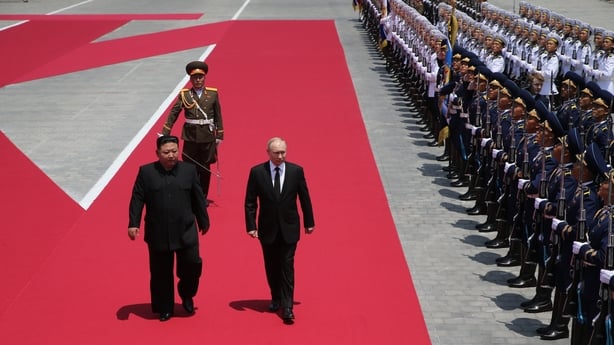Russia provided North Korea with oil, anti-air missiles and economic help in exchange for troops to support Moscow's war on Ukraine, government officials and a research group have said.
The United States and South Korea have accused the nuclear-armed North of sending more than 10,000 soldiers to help Russia fight Ukraine, with experts saying Kim Jong Un was eager to gain advanced technology, and battle experience for his troops, in return.
Asked what South Korea believes Mr Kim has received in return for the troops, top security advisor Shin Won-sik said: "It has been identified that equipment and anti-aircraft missiles aimed at reinforcing Pyonyang's vulnerable air defense system have been delivered to North Korea."
Speaking to local broadcaster SBS, Mr Shin added that North Korea has received "various forms of economic support" and "following the failure (launch) on May 27, North Korea has been working on satellite-related technology".
Experts have previously said that in return for the troops, North Korea was likely aiming to acquire military technology, ranging from surveillance satellites to submarines, as well as possible security guarantees from Russia.

It obligates both states to provide military assistance "without delay" in the case of an attack on the other and to cooperate internationally to oppose Western sanctions.
Mr Putin hailed the deal as a "breakthrough document".
Experts say North Korea could be using Ukraine as a means of realigning foreign policy.
By sending soldiers, North Korea is positioning itself within the Russian war economy as a supplier of weapons, military support and labor - potentially bypassing its traditional ally, neighbour and main trading partner, China, according to analysts.
Russia can also provide North Korea access to its vast natural resources, such as oil and gas, they say.
North Korean Foreign Minister Choe Son Hui recently visited Moscow and said her country would "stand firmly by our Russian comrades until victory day".
She called Moscow's offensive against Ukraine a "sacred struggle" and said Pyongyang believed in Putin's "wise leadership".
North Korea and Russia are under rafts of UN sanctions - Mr Kim for his nuclear weapons program, and Russia for the Ukraine war.
When asked publicly about the deployment of North Korean troops last month, Mr Putin deflected the question to criticise the west's support of Ukraine.
North Korea said last month that any troop deployment to Russia would be "an act conforming with the regulations of international law", but stopped short of confirming that it had sent soldiers.
North Korea's deployment of troops has led to a shift in tone from Seoul, which has resisted calls to send lethal weapons to Kyiv, but recently indicated it might change its long-standing policy.
Nth Korea receives oil imports breaching UN sanctions
North Korea has likely received more than 1 million barrels of oil from Russia over an eight-month period this year in breach of UN sanctions, according to an analysis of satellite imagery published by UK-based Open Source Centre and the BBC.
North Korean oil tankers have made more than 40 visits to Russia's Far Eastern port of Vostochny since March, the report on the research group Open Source Centre's website said.
"Dozens of high-resolution satellite images, AIS (Automatic Identification System) data and imagery released by maritime patrol missions tasked with monitoring North Korea's UN-sanctions busting activities show North Korean tankers repeatedly loading at an oil terminal at the Russian port of Vostochny," the report said, adding that Russia’s foreign ministry did not respond to a request for comment.
Pictures also showed empty tanks leaving almost full after arrival, the report said, quoting British Foreign Secretary David Lammy saying that the oil was payment for weapons and troops North Korea had sent to Russia.
North Korea has continued to illicitly import refined petroleum products in violation of UN Security Council resolutions, according to the UNSC.
Earlier this year, the US and South Korea launched a new task force aimed at preventing North Korea from procuring illicit oil as a deadlock at the UNSC cast doubts over the future of international sanctions.
Under UNSC restrictions imposed over North Korea's nuclear weapons and missile development, Pyongyang is limited to importing 500,000 barrels of refined products a year.

